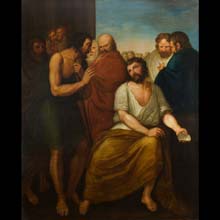
material: oil on canvas
dimensions: 155 x 124 cm
description: Aristides from Athens (ca 540 – ca 468 BC) was nicknamed “the Just” still in his lifetime. Disputes over the way of defending Athens against Persians ended in the ostracism of Aristides, that is expelling him from the city in 482 BC. Citizens voted by scratching the name of a person they wished to expel on ostrakas, that is pieces of broken pottery. However, when the Persian invaders were planning to attack again, the exile was recalled to lead the defence. The Greeks won, for example, thanks to the establishment of an association of Greek city-states, referred to as the Delian League, which Aristides contributed largely to. He was appointed to the position of treasurer of the League, which he held with great honesty and selflessness. Legend has it that during the voting on expelling Aristides from the city, an illiterate man came up to Aristides himself and, not knowing who he was talking to, gave the latter his voting potsherd and asked him to write upon it the name of “Aristides.” He desired to banish the Greek hero because it irritated him to hear everyone call him “the Just.” Despite this peculiar reason, Aristides wrote his name on the potsherd not telling the man who he was. Smuglewicz recalled the legend when the Four-Year Seym began its sessions. The painter cited this example of patriotism and dedication to the country that Poland expected from its citizens. The painting is the painter’s replica of the work signed and dated in 1788, exhibited in the Royal Castle in Warsaw. Barbara Ciciora
exposition: The Gallery of 19th Century Polish Art in Sukiennice,
The Cloth Hall, 1, Main Market Square
key: Enlightenment >>>
dimensions: 155 x 124 cm
description: Aristides from Athens (ca 540 – ca 468 BC) was nicknamed “the Just” still in his lifetime. Disputes over the way of defending Athens against Persians ended in the ostracism of Aristides, that is expelling him from the city in 482 BC. Citizens voted by scratching the name of a person they wished to expel on ostrakas, that is pieces of broken pottery. However, when the Persian invaders were planning to attack again, the exile was recalled to lead the defence. The Greeks won, for example, thanks to the establishment of an association of Greek city-states, referred to as the Delian League, which Aristides contributed largely to. He was appointed to the position of treasurer of the League, which he held with great honesty and selflessness. Legend has it that during the voting on expelling Aristides from the city, an illiterate man came up to Aristides himself and, not knowing who he was talking to, gave the latter his voting potsherd and asked him to write upon it the name of “Aristides.” He desired to banish the Greek hero because it irritated him to hear everyone call him “the Just.” Despite this peculiar reason, Aristides wrote his name on the potsherd not telling the man who he was. Smuglewicz recalled the legend when the Four-Year Seym began its sessions. The painter cited this example of patriotism and dedication to the country that Poland expected from its citizens. The painting is the painter’s replica of the work signed and dated in 1788, exhibited in the Royal Castle in Warsaw. Barbara Ciciora
exposition: The Gallery of 19th Century Polish Art in Sukiennice,
The Cloth Hall, 1, Main Market Square
key: Enlightenment >>>












